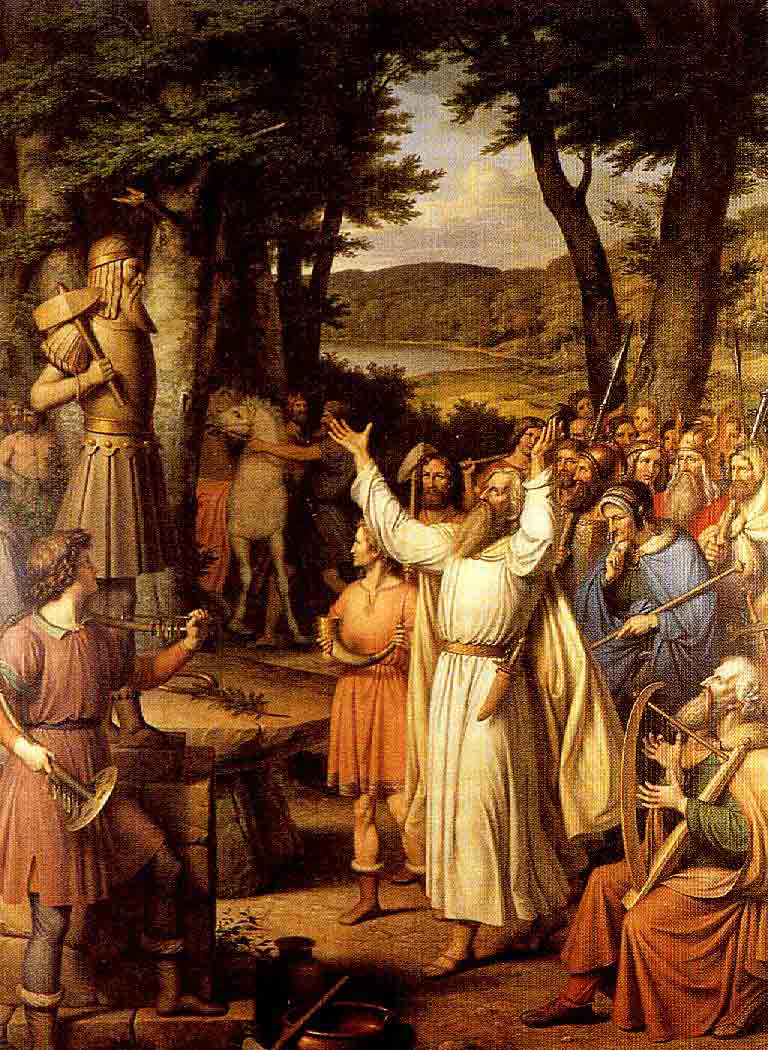"If Jesus suffered and died, why is it called Good Friday?
The term "Good" as applied to Good Friday is an Old English expression meaning holy.
It's often called Holy Friday also."
https://www.al.com/life/2019/04/if-jesus-suffered-and-died-why-is-it-called-good-friday.html
"According to the New Testament, Jesus gave the Passover meal a new meaning, as in the upper room during the Last Supper he prepared himself and his disciples for his death.
He identified the matzah and cup of wine as his body soon to be sacrificed and his blood soon to be shed."
________________
"The name Friday comes from the Old English Frīġedæġ, meaning the "day of Frige", a result of an old convention associating the Germanic goddess Frigg with the Roman goddess Venus, with whom the day is associated in many different cultures. The same holds for Frīatag in Old High German, Freitag in Modern German, and vrijdag in Dutch.
The expected cognate name in Old Norse would be *friggjar-dagr. However, the name of Friday in Old Norse is frjá-dagr instead, indicating a loan of the week-day names from Low German.[3] The modern Scandinavian form is Fredag in Swedish, Norwegian, and Danish, meaning Freyja's day. The distinction between Freyja and Frigg in some Germanic mythologies is contested.
______________
https://en.wikipedia.org/wiki/Bl%C3%B3t
"The word blót is an Old Norse strong neuter noun (genitive blóts). The corresponding Old English neuter blōt (genitive blōtes) may be influenced by Old Norse; the Old English gospels have prefixed ge-blōt "sacrifice".
The reconstructed Proto-Germanic form of the noun is *blōtą "sacrifice, worship". Connected to this is the Proto-Germanic strong verb *blōtaną with descendants in Gothic 𐌱𐌻𐍉𐍄𐌰𐌽 (blōtan), Old Norse blóta, Old English blōtan and Old High German bluozan, all of which mean "to sacrifice, offer, worship".
The word also appears in a compound attested in Old Norse as blót-hús "house of worship" and in Old High German as bluoz-hūz "temple". With a different nominative affix, the same stem is found in the Proto-Germanic noun *blōstrą "sacrifice" — attested in Gothic *𐌱𐌻𐍉𐍃𐍄𐍂 (*blostr) in 𐌾𐌿𐌸-𐌱𐌻𐍉𐍃𐍄𐍂𐌴𐌹𐍃 (guþ-blostreis) "worshipper of God" and Old High German bluostar "offering, sacrifice").
This stem is thought to be connected to the Proto-Germanic verb *blōaną "to blow; to bloom, blossom", as are the words for "blood" (Proto-Germanic *blōþą) and "bloom" (Proto-Germanic *blōmô).
Sophus Bugge was the first to suggest a connection between blót and the Latin flamen (< *flădmen), and both words can be traced back to the Proto-Indo-European stem *bhlād- "to bubble forth; to mumble, murmur, blather".
The Summer blót was undertaken in the middle of April (about four weeks after the spring equinox) and it was given to Odin.[5] Then, they drank for victory in war and this blót was the starting date for Viking expeditions and wars."

" Ybor and Agio called upon Frea, Godan's wife. Frea counseled them that "at sunrise the Winnil[i] should come, and that their women, with their hair let down around the face in the likeness of a beard should also come with their husbands".
At sunrise, Frea turned Godan's bed around to face east and woke him. Godan saw the Winnili, including their whiskered women, and asked "who are those Long-beards?" Frea responded to Godan, "As you have given them a name, give them also the victory".
Godan did so, "so that they should defend themselves according to his counsel and obtain the victory". Thenceforth the Winnili were known as the Langobards (Langobardic "long-beards")
https://en.wikipedia.org/wiki/Frigg
No comments:
Post a Comment